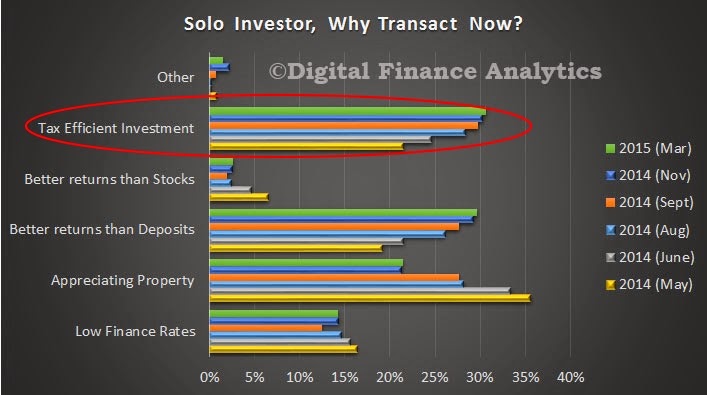So if negative gearing is limited to new homes only, what happens to the established stock? Who does it get sold to?
Of course there is a need for rentals, but the balance is clearly out of whack in some cities (for example Sydney when stats show new finance is circa 50% investors).
Current
Buyers of established houses - investors and OOs (including FHB)
Buyers of new houses (including units) - investors and OOs (including FHB)
Increase demand comes from - home leavers, migrants, overseas students, interstate workers, FIFO, financially limited situations (bankrupts, sickness, accidents, family breakups, other unforseen priorities)
Proposed abolition of NG
Abolition of NG will raise the threshold of financial feasibility of an investment - a disincentive by intention and will prove to be in practice. NG will quarantine losses from being aggregated with the other income of the individual investor. The individual investor will have to bear the loss until his portfolio of IPs become positive and tax is then paid. Abolition of NG will put a damper on investing in rental properties - on established properties alone or with new also, depending on the policy option to be chosen.
The investor, if he has economic sense and financial nous (otherwise he will rightly be called a speculator) will calculate whether he wants to invest in such an environment. Some investors will recognise the impact of the policy earlier than others, but both will be impacted financially by the proposed policy.
Clearly, there is broad support that investors in new IPs provide new supply. But, I suggest that the investor also provides 'new' supply in IP when he renovates and maintains an established property for tenancy. If such an investor were pushed out of the market and demand remains unchanged, rent must go up. Such investors make it possible to recycle many established properties, making it possible to keep rent lower than if only new properties are available as IPs. (Generally, old is less expensive than new and reflected in rent.) By disincentivising investment in established properties does not mean that the repulsed investor will be diverted to investing in new properties. New IPs may not be possible where there is most rental demand, where it needs to be built. 'Repulsed' investor may not be able to find a suitable new IP to continue as a player in the housing economy. 'Repulsed' investor becomes inactive in the housing market leading to a loss of supply.
The economic scenario below assumes that abolition of NG still allows new IP to retain NG:
Established IP - no NG.
Investors unable to demonstrate financial feasibility for established IPs nor with new IPs alone - repulsed and pushed out of market, supply drops.
OOs for established property rejoice for a few years (notably FHBs) - as competition from investors repulsed.
'Repulsed' investors do not necessarily translate to investors in new IPs as financially less feasible (even with NG - not speculator) - vacate housing market to await higher rent environment or compelling low price to re-enter market.
Less supply for tenancy.
For the more long term tenants - higher rent, especially in areas already built up and depends on established properties to be re-cycled to IPs, or localities mainly occupied by tenants.
The argument above refers to 'repulsed' investor in established properties means both established investors and future new entrants. It becomes a disincentive on supply, which implies a step to a higher rent environment.

